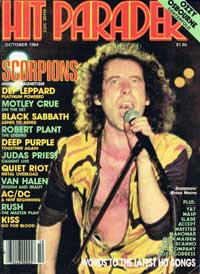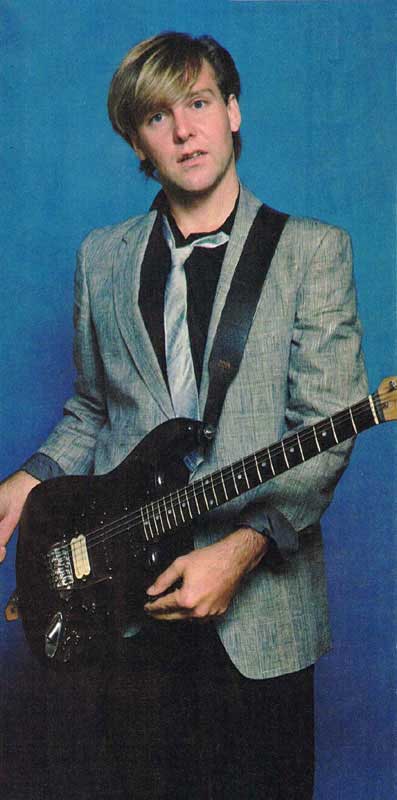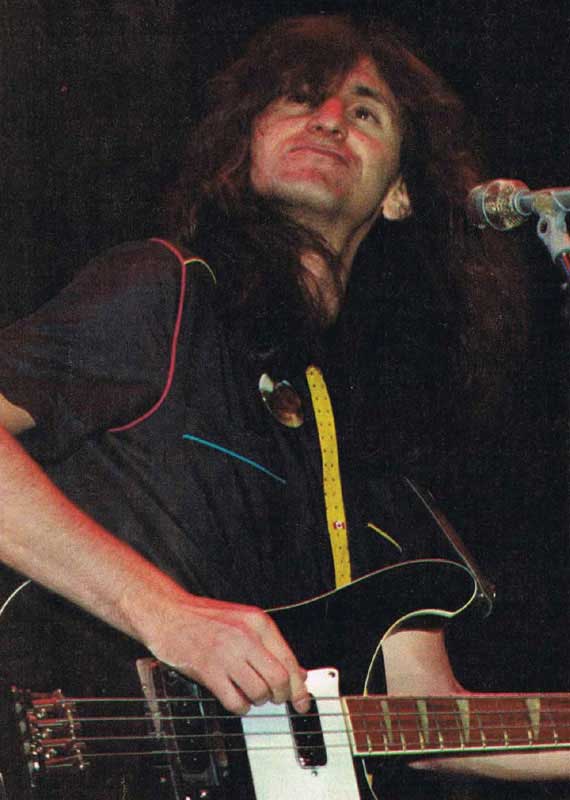Grace Under Pressure Proves Canadian Trio Remain Masters Of Eclectic Metal
By Don Mueller, Hit Parader, October 1984, transcribed by pwrwindows

Geddy Lee sat quietly in Rush's backstage dressing room transfixed by the tiny images on the screen before him. "Hey, it's almost time to go on stage," guitarist Alex Lifeson said, trying to rouse Geddy from his TV obsession. "Not now, not now," Lee shot back in annoyance. "It's the bottom of the ninth, and the Expos are down by one - do you really expect me to leave at a time like this?"
Few things can draw the members of Rush away from playing their music, but in the case of Lee, a good baseball game is one of them. "We're so conservative it's sickening," said the hawk-nosed bassist/vocalist. "Most rock and roll bands are into drugs and groupies - we're into sports. There's something about a good baseball game that's very special. Baseball is a lot like the music we play. There's an entertainment value to it, but underneath everything there's a great deal of thought and planning that goes into what's going on. On stage we're like a team, we each have our positions and our specific responsibilities - I guess you could think of us as the Rush All-Stars."
With the success of their latest album, Grace Under Pressure, Lee, Lifeson and drummer Neil Peart have again displayed their league-leading musical skills that over the last decade, have continually made them candidates for the title of rock's Most Valuable Players. Since their earliest days as a heavy metal trio playing the Canadian club circuit, Rush have combined their stellar instrumental skills with an inventive musical spirit to emerge as one of the most exciting and popular bands in the world.

"Success has meant a great deal to us because we've been able to achieve it on our own terms," Lifeson explained. "A lot of groups sell out their principles in order to sell a few more records, Rush has never wanted or needed to do that. In fact, if anyone had ever suggested that we play a certain style of music, we would have rejected the notion as well as that person, instantaneously. That almost occurred in our early years together - somebody told us to stick to just being a pure heavy metal group. We enjoy rocking out as much as anybody, but the fact that somebody told us we shouldn't even think about maturing as a band upset us all.
"That's why each Rush album has been part of our overall growth process," he added. "The new album picks up many of the pieces that we've had on the last couple of LPs, but it introduces many new elements into the Rush sound. There's no way anyone can ever say that we're mired in a musical rut, that's for sure."
On such new tracks as "Distant Early Warning", "Red Sector A" and "The Body Electric", the band's creative melding of standard rock precepts with exotic instrumentation sounds has once again allowed Rush to create music unique to the rock world. Lee's distinctive vocals timbre adds a refreshing yet familiar element to each number, but as Lifeson pointed out, "There will never be room in this band to rest on our accomplishments. Each album is a challenge to our creative capacities."
"This is one of our most satisfying records," Geddy said in regard to Grace Under Pressure. "We spent nearly five months recording it up in Quebec at Le Studio and there really wasn't much wasted time during those months. We worked with producer Peter Henderson for the first time, and he proved to be incredibly helpful to us. We're not the easiest band in the world to produce because we already have a preconceived notion about what we want to sound like. We're always anxious to have new input, but we don't need anyone to come in and tell us what we're doing wrong.
"The last thing we wanted to do was tie Peter's hands," Geddy added. "We had discussed everything quite carefully before we got down to recording. In fact, many of the songs had been written six or seven months before we even went into the studio. Making albums isn't an overnight proposition for Rush, we take a great deal of time and effort with every note we put down on vinyl. We want to be able to listen to this record 10 years from now and still enjoy it. That's really the secret of our success - we've always taken a great deal of pride in our music."

Few bands have enjoyed a more checkered career than these three music merchants from the Great White North. Their early albums, such as Fly By Night and Caress Of Steel, did little to distinguish the group from countless other power trios who were attempting to parlay volcanic guitar riffs and frenzied vocals into stardom. Somewhere along the line, however, Rush realized that hard rock audiences could appreciate a band that played with sophistication as well as skill. and by the 1976 release of their breakthrough album 2112, they had clearly split away from the hoard of Zeppelin-influenced metal mashers.
"There was never a moment when we sat around and said, 'Hey, let's write a song that lasts a whole album side,'" explained Peart, who doubles as the band's lyricist. "That was just a natural progression for us. We were pleased with our first few albums, but we began to mature as a band and we wanted to test ourselves - 2112 gave us that opportunity. When it became successful, it opened up the door for us to try virtually anything our imaginations could dream up."
In the wake of 2112's success, Rush blossomed into one of the most popular attractions in music. Their follow-up albums, such as A Farewell To Kings and Hemispheres, sold in the millions, and their concert tours packed houses from Toledo to Tokyo. It was, as Lee admitted, "an incredible time of growth for us. The feeling of confidence it gave us was overwhelming. When you strive to be a little different, and people accept that, there's no greater satisfaction anywhere."
The band's greatest satisfaction still lay ahead, however, and by 1980's Permanent Waves, Rush was able to attain one goal that had eluded them for years - a major radio hit. That song was ironically entitled The Spirit of Radio, and as its pulsating riffs echoed out of radios everywhere, Rush's popularity escalated at an unprecedented rate. More fuel was added to the band's commercial fire with the subsequent release of such chart-topping discs as Moving Pictures, and last years' Signals, each of which further expanded Rush's ever-growing artistic scope.
"One of the things we've learned to do over the years is utilize sound effects," Lifeson said. "On Signals, for instance, we had a tape of a NASA space launch on 'Countdown', and it really aided the song's impact. That's something we've done on this album as well. When we were up at Le Studio we used to occasionally take a day and just record sounds - it didn't matter if it was the coffee percolating or the wind whistling through the pines. We're always looking for elements that can expand our musical canvas."
Undeniably, Grace Under Pressure is the most expansive Rush album ever recorded. From the intricate beauty of "Afterimage" to the power of "Between The Wheels", Rush has managed to create a vivid aural tapestry - a rich collection of styles and sounds that blend to create yet another intriguing chapter in Rush's continuing book of success.
"We're still as exhilarated by creating music today as when we first started out," Lee explained. "As long as a band continues to challenge itself there should never be a problem with attaining satisfaction. We'll never feel any differently - we'll always enjoy playing rock and roll more than anything, except maybe playing right field for the Expos."